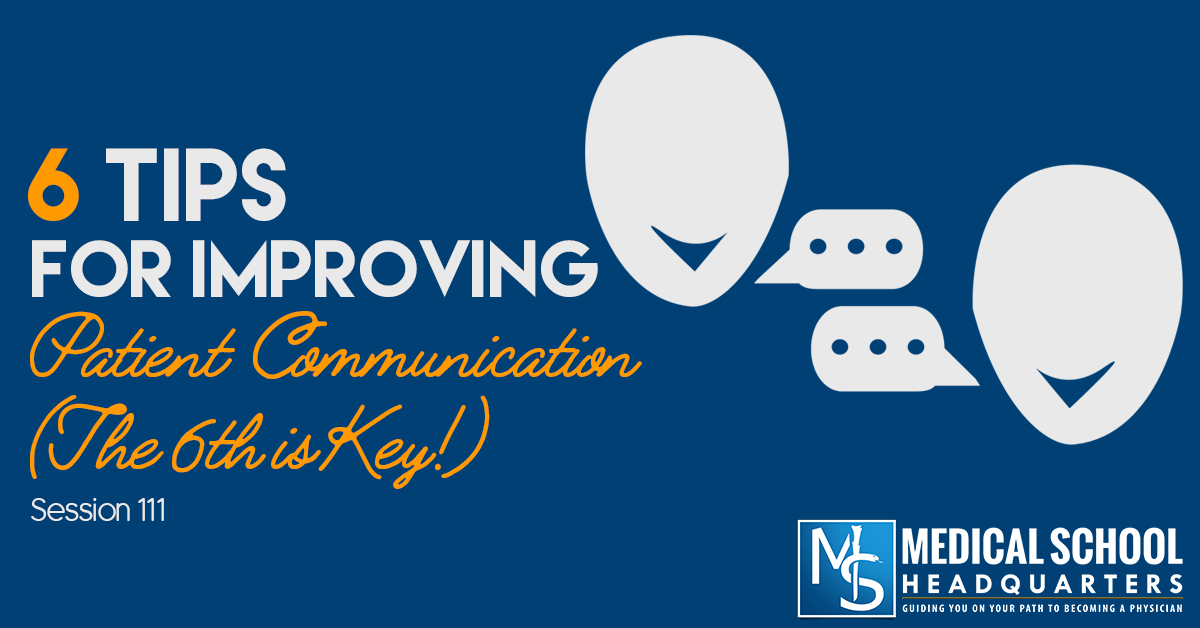Apple Podcasts | Google Podcasts

Session 111
Today we discuss how to improve patient communication.
Communicating and building relationships with patients is one of the most important parts of health care. Having a better understanding of your patients leads to better job satisfaction for you, better patient satisfaction, and better health outcomes as well.
Even as a premed, you can improve your patient communication skills. The more you can learn about and practice communication with patients as a premed, the better you will be at it in medical school and beyond.
Listen to this podcast episode with the player above, or keep reading for the highlights and takeaway points.
Why Patient Communication Is So Important
This episode was been sparked by a recent article in The New York Times called “Doctor, Shut Up and Listen,” which was written by Dr. Nirmal Joshi.
Dr. Joshi quotes several studies about communication breakdown between doctor and patient and what that leads to. Here are some facts and figures that were mentioned in the article:
- The Joint Commission reported that communication failure rather than any lack of technical skills or understanding was at the root of over 70% of serious adverse health outcomes in hospitals.
- Two out of three patients leaving the hospital don’t know their diagnosis.
- In 60% of cases, patients walk away from a doctor’s visit not understanding what they’re supposed to do, instructions for medication and lifestyle change, etc.
Considering these alarming statistics and the huge impact that communication has on improving patient care, we’ve laid out six tips on how to improve your patient communication skills as a future physician.
6 Tips for Better Communication with Your Patients
1. Introduce yourself.
- 3 out of 4 doctors don’t introduce themselves to their patients.
- Assumed authority is not cool.
- Acknowledge not only the patient but also the family members in the room.
- How to introduce yourself to the patients: Should you just use your first name or should you add “Dr.”?
- Identify yourself clearly as a member of the health care team.
2. Speak in layman’s terms.
- Translate technical, medical terms into simpler terms.
- Don’t say “hypertension.” Say”high blood pressure.”
- Don’t say “hyperlipidemia.” Say “high cholesterol.”
- Complex, Latin-sounding medical terms can add to the patient’s anxiety.
3. Check if your patients understood you.
- Don’t just ask “Do you understand?” Patients will respond “yes,” but can they actually explain it back to you?
- Use the “teach back” method, as explained in the video below.
- Have the patient explain the treatment plan back to you.
4. Be adaptable.
- Slow down and adapt to the situation.
- Attend to other needs/questions of your patients.
- Show empathy.
- Be willing to share your time with the patient if they throw you a curveball.
5. Gain context for what’s going on the patient’s life.
- How do you interact with a noncompliant patient?
- Take the time to Learn who they are.
- Ask about the patient’s life in general.
[Related episode: Maximizing Your Shadowing Experience with Bedside Manner.]
6. Just be honest.
- Patients want the truth. Don’t beat around the bush.
- Be honest with yourself about how you deal with your patients.
- When you don’t know the answer to a patient’s question, be honest that you don’t know.
Bonus tip: Communicate effectively with your team.
- Respect all members of the health care team.
- You can use some similar principles of effective communication with your team members as with patients.
Links and Other Resources
- Check out my Premed Playbook series of books (available on Amazon), with installments on the personal statement, the medical school interview, and the MCAT.
- Related episode: 16 Golden Rules of Medicine for Premeds and Beyond.
- Related episode: How Much Clinical Experience Do I Need for Med School Apps?
- Need MCAT Prep? Save on tutoring, classes, and full-length practice tests by using promo code “MSHQ” at Blueprint MCAT (formerly Next Step Test Prep)!











